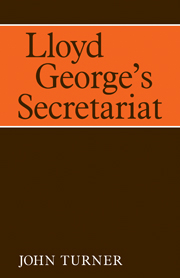Book contents
- Frontmatter
- Contents
- Acknowledgements
- Map of the Balkans, 1917
- 1 All in a garden fair
- 2 The new bureaucracy
- 3 Food and agriculture
- 4 Foreign affairs
- 5 Ireland
- 6 Imperial questions
- 7 The political culture of 10 Downing Street
- 8 Two malcontents
- 9 Conclusion
- Notes
- Bibliography
- Index
- Cambridge Studies in the History and Theory of Politics
2 - The new bureaucracy
Published online by Cambridge University Press: 23 November 2009
- Frontmatter
- Contents
- Acknowledgements
- Map of the Balkans, 1917
- 1 All in a garden fair
- 2 The new bureaucracy
- 3 Food and agriculture
- 4 Foreign affairs
- 5 Ireland
- 6 Imperial questions
- 7 The political culture of 10 Downing Street
- 8 Two malcontents
- 9 Conclusion
- Notes
- Bibliography
- Index
- Cambridge Studies in the History and Theory of Politics
Summary
My general conclusion is that co-ordination is a blessed word like Mesopotamia which is mouthed by people without practical experience.
G. N. Barnes,? 12 April 1918.The huge apparatus of government over which Lloyd George presided, and which the Garden Suburb helped him to rule, was very largely the product of war and especially of his own premiership. When war broke out the existing departments had been prepared for the immediate assumption of new duties by the institution of War Books at the instigation of the Committee of Imperial Defence. No machinery had been contemplated for managing a war economy. At first the war was run as a feverish commercial operation in which labour and capital took advantage of short supply and intense demand to exact large profits from the government. Unable to accept either the financial burden or the delays in production which resulted, the government resorted to controls over munitions production in the spring of 1915: these were embodied in the Munitions of War Act of July 1915, and munitions supply was made the responsibility of a single ministry. All extension of government control tended to follow the principle that effective control could only be achieved if the whole of each manufacturing process and the supply of raw materials could be brought under a single authority. The Ministry of Munitions was the first embodiment of the principle, and the first of many demonstrations of the difficulty of applying principle in administrative practice.
- Type
- Chapter
- Information
- Lloyd George's Secretariat , pp. 27 - 45Publisher: Cambridge University PressPrint publication year: 1980



